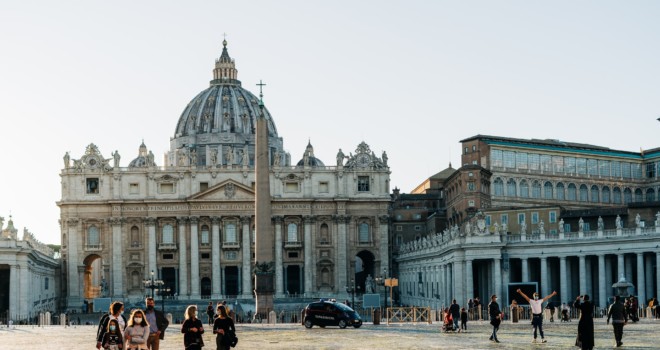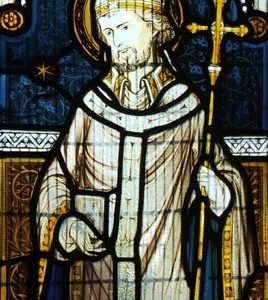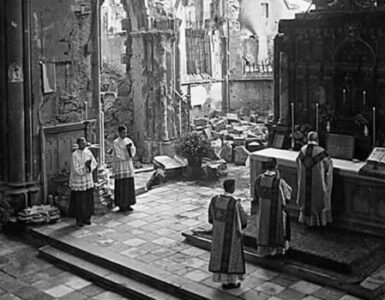What can be more important for Catholics today than a true sentire cum ecclesia, the feeling and thinking with the Church, out of ecclesial spirit. For this spirit is none other than the Spirit of Jesus Christ, because the Church itself is nothing other than the living, grace-giving Christ. The unmistakable sign of sentire cum ecclesia is, has always been and will always remain the attitude of romanitas, the loving and suffering gaze on Rome, which takes an interested interest in sharing, even and especially when the Mystical Body of Jesus Christ suffers a passion.
Based on his many years of experience as a Rome correspondent for various English-speaking media, journalist Edward Pentin provides unexpectedly deep insights into the current inner life of the Roman Catholic Church. His articles cover a wide range of different topics from religion, politics and society. Recently his book The Next Pope was published, which turns the spotlight on the “Men in Red”, from whose midst “the man in white” is chosen, the Vicarius Christi and shepherd over more than a billion Catholics.
Wolfgang Koch in conversation with Edward Pentin
What has prompted you to write this comprehensive and carefully researched book? Who has supported you? Which individuals were involved?
Edward Pentin: This book is the work of a number of people, two of whom had the idea for it a few years ago, and I essentially helped pull it together and fill in a number of gaps. The basic premise was the relatively unknown fact that not only do most of the faithful not know who the leading candidates are to be pope, but neither do many of the cardinals themselves. At the last conclave in 2013, some cardinals complained about a confusing process and a dearth of information on who they were voting for. Often they had to rely on others’ recommendations which were not always reliable. This problem has been made more acute as Pope Francis has ceased holding meetings of the College of Cardinals before cardinal-making consistories since 2016. Those gatherings were traditionally a good opportunity for cardinals to meet and get to know one another. This book is therefore primarily aimed at equipping cardinals so they better know who to vote for – or not vote for — as the case may be. But it’s also meant as a resource for the faithful, to give them a detailed knowledge of some of the cardinals most likely to be elected Pope and therefore also to know who, and what issues, to pray for.
You have clearly described the criteria of the candidate profiles, thus allowing comparisons. But according to which criteria did you select the 19 candidates?
Edward Pentin: We chose them on the basis of their backgrounds, reputations for leadership, sanctity, governance, teaching, and general favorability rankings in the Church. Each cardinal’s profile is presented in accordance with their offices as bishop as priest, prophet and king — so their sanctifying office, teaching office, and governing office — enabling the reader to ascertain how they came to be considered leading cardinal candidates. Of course as the old Roman saying goes, “Chi entra papa in conclave, ne esce cardinale” (whoever enters a conclave a pope, leaves it as a cardinal), so it’s naturally possible the next pope will be none of these just as Cardinal Jorge Mario Bergoglio was not included on most papabili lists in 2013, but naturally we believe these 19 stand the best chance of being elected for the reasons I’ve described.
For the prominent historian Roberto de Mattei you are one of the best journalists he knows. How did you become a journalist and what has brought you to Rome?
Edward Pentin: That’s kind of Professor de Mattei to say. Ever since I edited my university magazine in England in the 1990s I have enjoyed the challenge of reporting and after a few years teaching abroad, I obtained a diploma in journalism at the London School of Journalism. I then came to Rome in 2002 to work at Vatican Radio before going on to cover the Vatican for various Catholic and secular publications including Newsweek and Newsmax.
German readers are interested in how the situation of the Church in their country is perceived. How does “Rome” think about the “Synodal Way” or the vehement criticism of the recent papal instruction on the pastoral conversion of parishes?
Edward Pentin: Unfortunately it is never possible to give an unofficial and unified opinion of what the Vatican thinks as a variety of opinions exist and it depends to whom you speak. Even the official line will sometimes be contested internally. But I would say that generally speaking senior officials down are concerned about the situation in Germany. There’s a sense that bishops there are pushing matters too far, and that they may eventually overplay their hand and lead the Church in Germany into schism. The Pope, through his letter to German bishops last year, voiced his concern about the Synodal Way, as have other senior prelates including German Cardinals Gerhard Müller and Walter Brandmüller. The recent strong indications from the Congregations for Clergy and for the Doctrine of the Faith show a divergence on crucial matters which points to a major clash in in the next couple of years if the Church in Germany continues along the path it appears to be wishing to go.
When Rome emphasizes the role of priesthood and the sacramental constitution of the Church, the question of the liturgy arises. What value does the so-called “extraordinary form of the Roman rite” have for Pope Francis and the silent majority of cardinals not mentioned in your book?
Edward Pentin: As far as Pope Francis is concerned, I believe he is not that concerned about the extraordinary form as he has only a marginal interest in the liturgy. He is also relatively friendly to the Society of St. Pius X partly because he saw the good work they did for the poor in Argentina. However, he is surrounded by advisers who are hostile to the Traditional Latin Mass and the SSPX who can influence his position, who I suspect urged him to have the CDF send out a questionnaire to the world’s bishops to ask about how they accommodate requests for Mass in the Extraordinary Form. It remains unclear what the purpose of that survey is. As for the other cardinals, again it is impossible to know exactly without asking them individually, but I would estimate that, given most of them now were ordained in the Novus Ordo, a simple majority of them are either indifferent to it or actively hostile.
Many people, not only Catholics, were moved by the extraordinary blessing Urbi et Orbi with the Holy Sacrament in the midst of the Corona Crisis. In Germany, however, there was talk of “retro-Catholicism” and “false fixation on the Eucharist”. Did Corona change the papal emphasis towards more traditional forms of piety?
Edward Pentin: I don’t believe it changed the Pope’s emphasis partly because of what I said above: for Francis, activism for the poor and the outcast seems more important to him than worship, although he does clearly value aspects of traditional piety.
Is the canonical regularization of the Society of St. Pius X a current topic in Rome? What resistance would the Pope have to reckon with if he wanted to push it forward?
Edward Pentin: I don’t believe it’s a priority at the moment but as I said above, he looks somewhat favorably on the SSPX but is surrounded by those who see them in a less positive light. Some rumors are circulating that this may lead to the termination of an office in the CDF aimed at working for the regularization of the Society with Rome (which used to be the Pontifical Commission Ecclesia Dei until last year) but there’s no confirmation of that.
From your personal perspective, what is contribution the Society of St. Pius X. could make to to rebuild Christianity?
Edward Pentin: From speaking to various members of the clergy and cardinals in Rome, I would say that Archbishop Lefevbre and the SSPX are seen more favorably than before because of what has happened to the post-conciliar Church, especially in recent years. But I think its role in rebuilding Christianity will continue to be looked upon with an element of skepticism in Rome until it can be fully regularized and leading churchmen, such as Cardinal Raymond Burke, no longer see it as schismatic.
World politics is currently dominated by the confrontation with China and its sinomarxist economic and social model. What constants and innovations do you see in the Vatican’s China policy?
Edward Pentin: It has been interesting to watch how the Vatican’s approach to China has evolved, or some might say, regressed, since Francis was elected. Under Benedict and John Paul II, the Vatican was much more cautious and although willing to express some openness to Beijing which Cardinal Joseph Zen Ze-Kiun and others opposed, never went down the route of Vatican Ostpolitik which both popes saw as a failure. Now that approach is in full swing at a time when China experts say Beijing is more antagonistic and tyrannical towards religion than possibly at any time since the Cultural Revolution. You could say the Vatican is being consistent in its Ostpolitik approach, but the Vatican has clearly broken from the vision of John Paul II and Benedict XVI even though repression of religion in China has increased during the rule of President Xi Jinping who coincidentally came to power the day after Pope Francis’ inauguration, on March 14, 2013.
Despite of a decades-long policy of “aggiornamento” – isn’t there currently an open Neo-Marxist “Kulturkampf” against the Catholic Church? How is the Church, how are the Catholics prepared for it? Do you see in the desecrations of churches, such as in France, a more general symptom?
Edward Pentin: From experts I’ve spoken to, I would say that is certainly a symptom. Just today I heard France is moving to join Germany in banning homeschooling which tends to be favored most by Catholic parents. There is also a sense, which Archbishop Carlo Maria Viganò has noted, that the Church’s current leadership is effectively paving the way for a greater persecution in the future by appeasing increasingly radical secular authorities. If we were to have a new Pope in the mold of Cardinal Robert Sarah, for example, someone expected to be fearless in orthodoxy and upholding the Church’s moral teaching, the expectation is that the soft persecution we are witnessing today would move into a much higher gear, but that the Church would shine more brightly as the only true instrument of salvation.
What is the actual status of the curia reform? What are its goals?
Edward Pentin: We continue to wait for the new constitution which I understand has been postponed because academic experts and bishops were unhappy with the draft that was circulated last year. The goals are greater efficiency, structural reform and better work practices to enhance evangelization efforts, primarily, but also more transparency and accountability when it comes to finance. The Council of Cardinals on Church reform, which Francis set up in 2013, has been criticized for not achieving much of real substance. None of the nine cardinals, for example, had any curial experience when they joined the council at the outset. That said, some efficiency has been realized through dicastery mergers and other steps, and the Vatican’s finances are slowly becoming more transparent, but with some notable setbacks and the odd questionable appointment. The frequent call is for root and branch reform, including replacements of personnel, rather than just cosmetic changes.
There seems to be loyal and disloyal opposition to the papal course in the Curia. What is your opinion of these forces?
Edward Pentin: There have always been divisions but they are much more pronounced now. I researched the management culture of the curia over the summer and morale is very low among many staff. There’s a pervading sense of fear, some officials feel vulnerable to superiors who can act with a certain lawlessness, the homosexual “lavender mafia” is ever-present, and more orthodox personnel fear making their views known for fear of being “labelled” and possibly dismissed. On the other hand, there are staff who are very happy with the direction of this pontificate, and some dicasteries are well run, but I would say they are in the minority.
Could one speak of characteristic “blind spots” and fixations of the Pope? Where do they seem to lie?
Edward Pentin: There are blind spots among both supporters and detractors of the Pope. Regarding the former, I would say they tend to ignore the contradictions of this pontificate, the lack of consistency with the Magisterium, a dictatorial method of papal rule, and a general weakening and undermining of papal authority, including moral authority — a trend many of them probably actually welcome. Among his detractors, there’s a tendency to fail to see God’s hand working through the mess. Intentionally or not, this pontificate has been a time of great revelation when much of the corruption of the past 60 years, whether regarding doctrinal matters, sexual abuse or financial malpractice, has come to the surface and so can be properly tackled and rooted out. It’s unlikely that would ever have happened to the extent it has under the pontificates of John Paul II and Benedict XVI.
Four years have passed since Amoris laetitia. How is this document seen today?
Edward Pentin: Despite all the controversy surrounding the document when it was published in 2016, little is said it about it now in Rome. It was only referred to once in Pope Francis’ new encyclical on human fraternity, for example, and it rarely comes up in conversation or in reference to other matters. It may be more widely referred to in dioceses and parishes but I don’t know.
Could the debt or abuse crisis endanger the sovereignty of the Vatican as a state?
Edward Pentin: This is always a concern, but at the moment there are no real threats to sovereignty that I am aware of.
Many thanks for the interview.
✠
Photo by Gabriella Clare Marino on Unsplash












